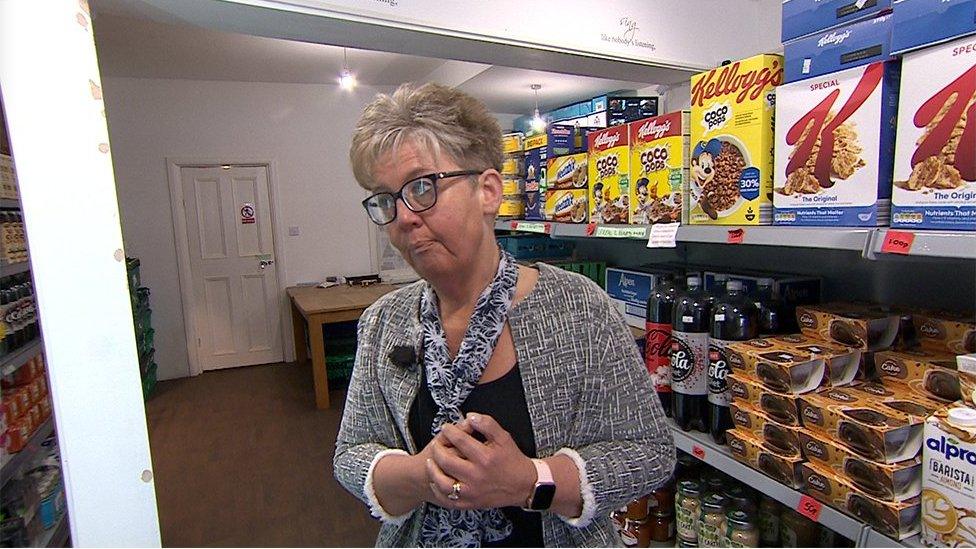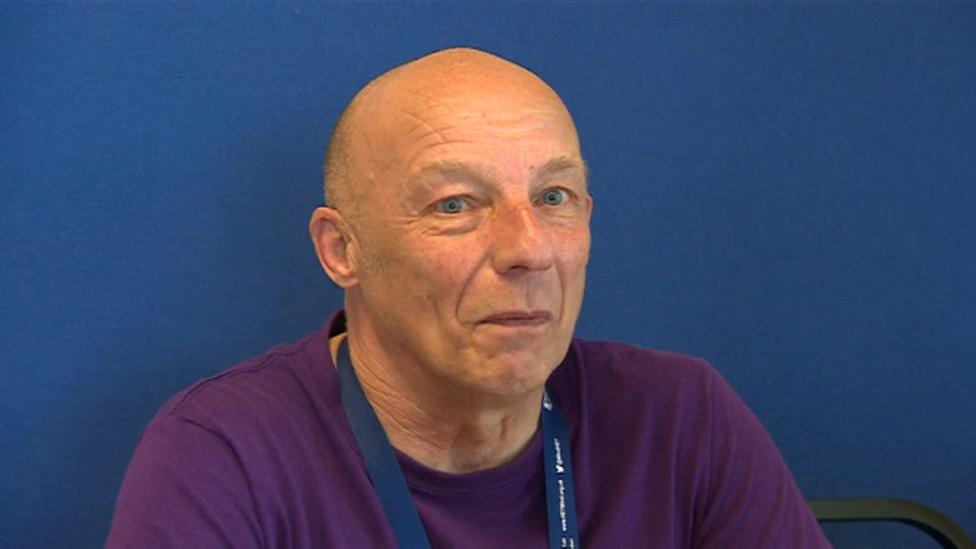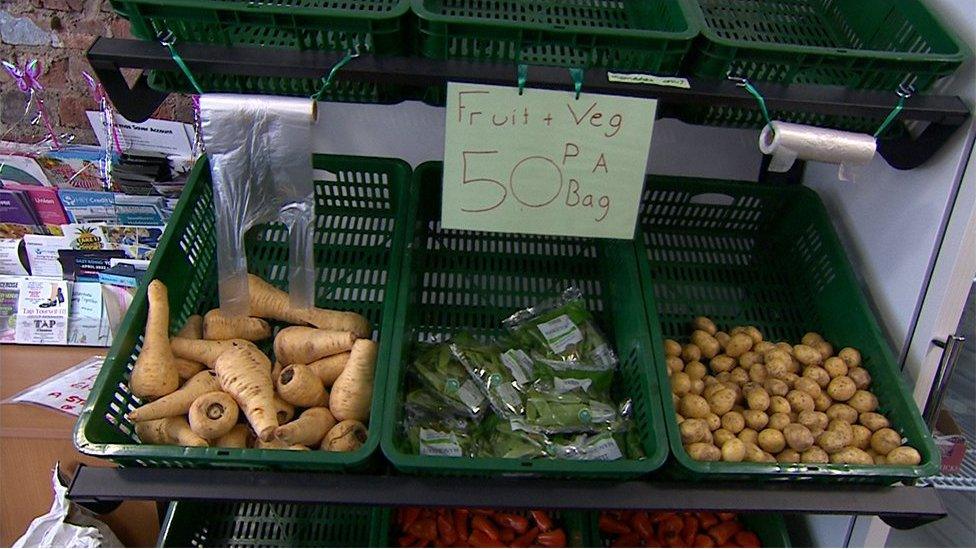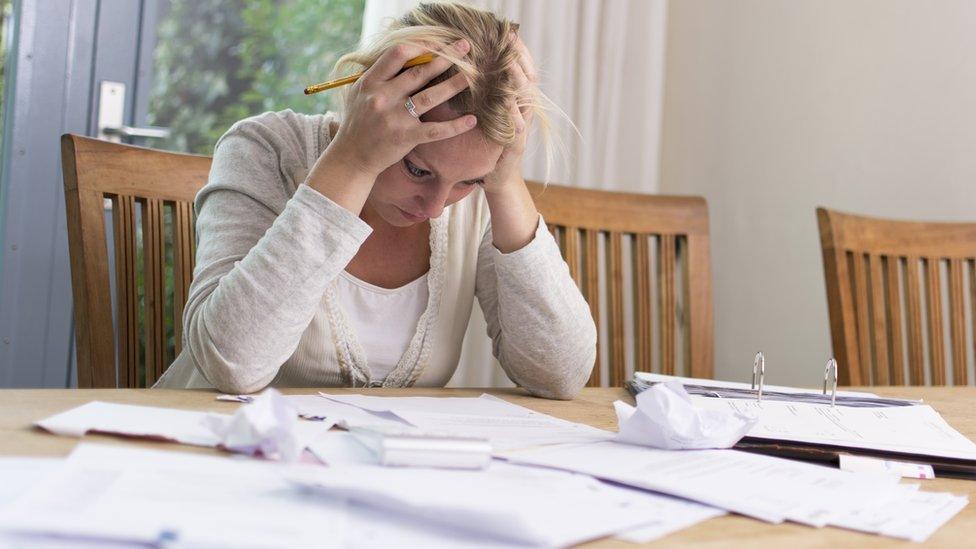Cost of living: Debt charity demand higher than ever
- Published

Jayne Nendick said the current cost of living crisis was the worst she had ever seen
As the cost of living soars in the UK, more and more people report their daily struggles to afford the basics. A charity worker who has been helping people with money issues for two decades says the situation in 2022 is the worst she has ever seen, but she remains determined to get people through.
Jayne Nendick has worked at The Shores Centre, in Withernsea on the East Yorkshire coast, for 17 years. The charity, based on the seafront just yards from the site of the town's former pier, aims to help people manage their money, access low-cost food and try to improve their wellbeing.
Chief executive Jayne says the situation for those struggling in 2022 is bleak. She has noticed spiralling demand help to tackle money issues.
"I'm seeing this every single day," she says, as she surveys the people dropping in for help at the centre.
"This is repetitive and it's heart-breaking. We're seeing older individuals, 75-year-olds who are now classed as homeless and sofa-surfing.
"This is the reality.
"It is the worst I have ever seen."
'Who doesn't worry?'
Dave, a 61-year-old who didn't want to be pictured, is among those calling in for help.
He speaks to the Shores Centre's advisers, and says that after settling his bills he has just £20 to see him through the next two weeks.
"Everything just goes straight out the bank. I just eat sandwiches," he says.
Smiling, he adds: "The other day I had some macaroni on toast which I haven't had in ages, which was nice.
"I worry. But who doesn't?"
He's not the only one.
Kevin Davies, also 61, was left struggling to pay his bills when he lost his job after a fall left him with disabilities.

Kevin Davies says that with help the future does not have to be as bleak as the present
He now volunteers with mental health charity Mind and says his own experiences have helped him to offer support to those struggling to cope.
"I was told I was entitled to £45 a week," he says.
"I was left thinking: 'I've worked all my life and how am I supposed to live off this?'"
Mr Davies says an empty wallet or purse had a deeper effect than just not being able to afford something.
"I've gone from not wanting to go out. Not wanting to talk. I've been in the deepest of ruts, suicidal on a few occasions."
He told us that demand for weekly drop-in sessions in the town had more than doubled, and the increase in demand meant The Shores Centre had been forced to introduce a waiting list for consultations.
Mr Davies says that people need to be made aware that, as desperate as their plight may be at the time, with help things could get better.
"It's going to be difficult but if you're careful and sensible and just think: 'It's not always going to be like this'," he says.
Jayne says she is "petrified" at the thought of what the future holds for the centre's users.
"We will lose a lot of good people from good communities," she says. "I'm hearing on a regular basis that people are at the end of their tether."
"I would get on my knees to central government and beg please do something now, we cannot wait until later this year. We need action now,"she says.
"We are trying our best using what we have, what resources we have got."

The Shores Centre in Withernsea has set up a community supermarket to sell low cost food
"We are trying our best using what we have, what resources we have got."
As well as debt advice, the centre has also created a community supermarket offering low-cost food donated from supermarket and businesses surpluses.
Jayne says it has also seen soaring demand, with daily visitors doubling from about 60 to 120 in the space of a year and likely to further increase.
Despite a future punctuated with uncertainly, Jayne and the people around her are determined to continue making a difference.
"These are good people. They've done the right thing all their lives. They don't deserve this.
"They need support and they need it now."
The Treasury told the BBC: "We understand that people are struggling with rising prices, and while we can't shield everyone from the global challenges we face, we're supporting British families to navigate the months ahead with a £22bn package of support.
"That includes saving the typical employee over £330 a year through a tax cut in July, allowing people on the Universal Credit taper rate to help people keep more of the money they earn - benefiting over a million families by around £1000 a year, and providing millions of households with up to £350 each to help with rising energy bills"
If you have been affected by issues raised in this story, contact the BBC Action Line for help and advice.

Follow BBC East Yorkshire and Lincolnshire on Facebook, external, Twitter, external, and Instagram, external. Send your story ideas to yorkslincs.news@bbc.co.uk, external.
Related topics
- Published9 May 2022

- Published9 May 2022

- Published6 May 2022

